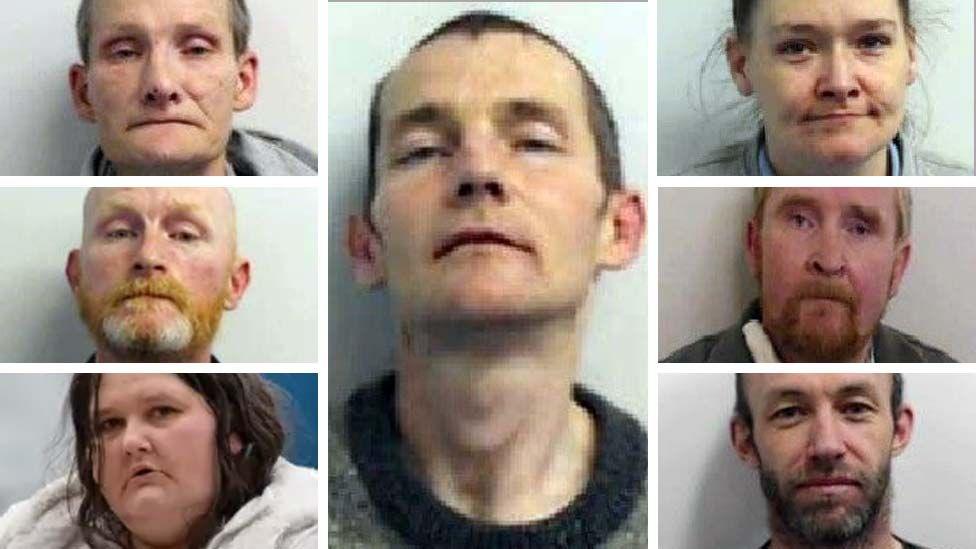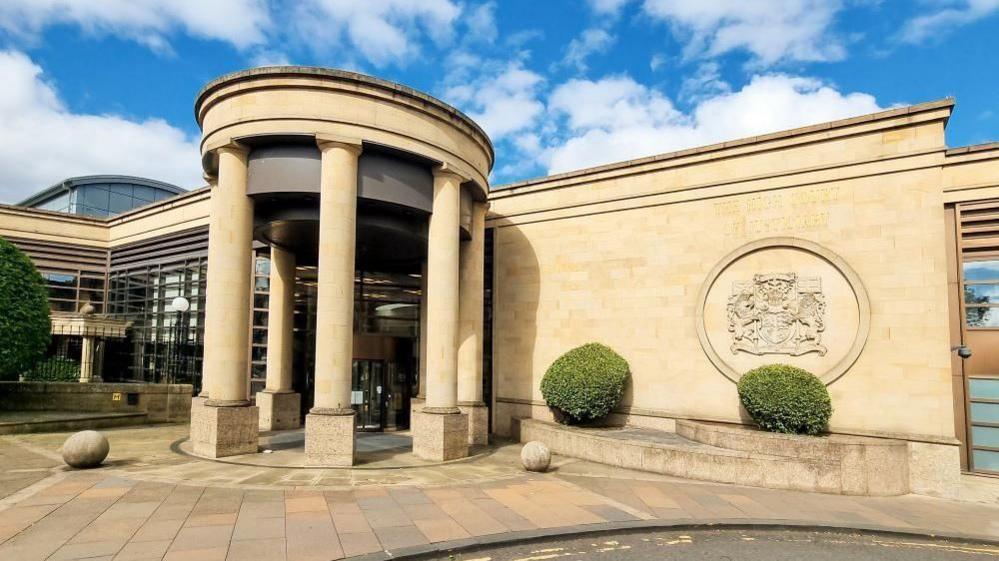Glasgow child sex abuse gang given life sentences

The people who were found guilty were (clockwise, from the centre): Iain Owens, Elaine Lannery, Scott Forbes, Paul Brannan, Lesley Williams, Barry Watson and John Clark
- Published
The seven members of one of Scotland's biggest child sex abuse rings have been given life-long sentences and warned that they may never be released.
Three victims under the age of 13 were subjected to horrific sexual abuse and violence in a Glasgow drug den dubbed "the beastie house" over a seven-year period.
Police said the children had suffered "unimaginable abuse", with the offences including rape, attempted murder and assault.
Iain Owens, 46; Elaine Lannery, 40; Lesley Williams, 43; Paul Brannan, 42; Scott Forbes, 51; Barry Watson, 48, and John Clark, 49, were jailed for between eight and 20 years and handed orders for lifelong restriction (OLRs).
These orders are reserved for the most serious court cases in Scotland which do not involve murder, and mean the individual will either be in prison or on parole for the rest of their life.
How victims shone a light on 'beastie house' child abuse ring
- Published27 January
Judge Lord Beckett told the gang, whose jail sentences totalled more than 93 years, that they may never be released from prison.
He said: "This court is used to hearing the worst examples of human behaviour but such depravity towards young children is beyond my experience.
"This is not typical behaviour and such extreme abuse of children seems to be rare."
He praised the "formidable strength" of the children and their "courage and perseverance", despite threats from Owens.
Lord Beckett added: "It is possible to imagine from their desperate darkness, their carers have brought some light to their young lives - a home, a structure and nurture over a number of years."
The judge, Lord Beckett, praised the bravery of the children in giving evidence that helped bring their abusers to justice
The judge also highlighted the victim impact statements and said one child wrote with "agonising articulacy" about her ordeal and the suffering of the other children.
He added: "In stark contrast to what was inflicted on her, and its impact, an impression of innate humanity shines through her words."
Warning: This article contains details readers may find upsetting
Two girls and a boy were violently and sexually assaulted on multiple occasions between 2012 and 2019.
The trial heard that the gang would hold "rape nights" and "dance and sex nights" in a squalid flat in Glasgow that was frequented by drug users.
A girl was raped by members of the gang while she was still young enough to wear a nappy.
She described the flat as the "dark and scary beastie house" because she had been locked in a cupboard with a box that was full of spiders.
The girl was also shut in an oven and a fridge and was forced to eat dog food.
An older boy and girl were also subjected to savage beatings and sexual violence.
Members of the gang also used Class A drugs in front of the children and caused them to consume alcohol and drugs.
The trial heard that the children first came into contact with social work in Glasgow in August 2017 and were deemed to be at risk in July 2018.
But the allegations of violence and sexual abuse did not come to light until March 2020.
Child abuse ring victims suffered 'horrific ordeal'
- Published14 November 2023
Child abuse ring warned of potential life sentence
- Published4 January 2024
Police were alerted by a man who had got to know the children. One of the victims became hysterical when she mistakenly thought she had been shut in a room.
The man and his wife then documented details of what the children recalled happening at the hands of the gang.
Jurors were also told Owens, Lannery, Williams, Watson, Clark and Forbes - who was known as Scott the Cameraman - all had previous convictions but none were for any type of sex crime.
The gang had denied the charges but were found guilty in November 2023 after a two-month trial at the High Court in Glasgow.
Owens, Lannery, Brannan and Williams were found guilty of attempted murder.
Charges related to causing the children to take part in seances and witchcraft were dropped during the trial.
Sentencing had been delayed until now because of delays in risk assessments which were ordered to help Lord Beckett decide whether to impose the lifelong restriction orders.
Owens was jailed for at least 20 years before he can apply for parole, Lannery for 17 years, Brannan for 15 years and Williams for 14 years.
Clark was sentenced to at least 10 years, Watson to nine years and six months, and Forbes to eight years.

Lord Braid said the High Court in Glasgow was used to hearing "the worst examples of human behaviour" but added such depravity towards young children was "beyond my experience"
Another woman, 40-year-old Marianne Gallagher, was convicted of one count of assault to injury but was cleared of all other charges.
Her sentencing was initially deferred for 12 months for good behaviour and returned to court on 6 January this year.
She was spared further punishment and admonished by Lord Beckett after he heard Gallagher had not offended over the last year.
After the sentencing, Det Insp Lesley-Ann McGee said it had been "a long, complex and challenging investigation" and that she hoped the outcome could help the young victims move forward.
She also urged anyone who has been affected by abuse to contact Police Scotland, external, no matter how much time had passed.
Colin Anderson, independent chair of Glasgow's child protection committee, said the case would now be the subject of a case learning review.
He said this would be led by an independent expert and feature input from agencies, individuals and families.
Mary Glasgow, chief executive at Children First, external, said no sentence would reflect the "extreme cruelty and horrifying abuse" that the children experienced.
She added: "The depths of their suffering will be unimaginable to most people in Scotland, but none of us should turn away from it.
"This is one of the most extreme cases of abuse ever seen in a Scottish court, but every day children and young people in Scotland are experiencing violence and abuse."
What is an order for lifelong restriction?
Leading KC Tommy Ross said orders for lifelong restriction (OLRs) are reserved for the most serious court cases which do not involve murder.
Before an order is imposed the subject must undergo an extensive risk assessment process, conducted by psychologists, which typically takes about 12 weeks.
A judge then sets a minimum prison term – known as the punishment part – that the offender must serve before they are eligible to apply for parole.
And, if granted parole, they are subject to recall back to prison in the event that they commit any new offences or breach the terms of their release.
Mr Ross told BBC Scotland News: "Essentially when you get an order for lifelong restriction you will either be in prison or parole for the rest of your natural life."
In 2023/24 a total of 18 OLRs were imposed in courts across Scotland
If you are affected by any of the issues raised in this story, support and advice is available via the BBC Action Line.